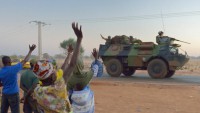
This piece, written by Danny Hirschel-Burns, from Swarthmore College STAND, originally appeared on his blog The Widening Lens.
Following France’s intervention in northern Mali four days ago, the prospects for a rebel advance to Bamako look bleak. Despite a brief resurgence of the rebel advance following initial French airstrikes, it looks as if French firepower will halt further rebel movements southward. Though the French intervention has changed the military dynamics for the immediate future, it has done next to nothing to address the root causes of the conflict, and furthermore, regional stability. The Mali crisis, which has now become the Sahel crisis, is too complicated for a purely military solution, and so the UN and regional actors must get serious about their diplomatic efforts.
France’s intervention, according to some critics from the far left, is simply a neo-colonial enterprise undertaken by a power-hungry former colonial power. This reading, however, is simplistic. The intervention came at the behest of the acting government (concerns regarding the government’s legitimacy aside), and
France’s actions are widely supported south of rebel/Islamist lines. The intervention stopped the very real threat of an Islamist advance on Bamako, a fate that no one, non-interventionists included, want. Despite these mitigating caveats, there are still many factors that problematize a French-led military solution. First, there are no reports on the feelings of northern Malians regarding French intervention, partly because news coming out of Islamist areas is limited, but also because even if there individual voices reaching the outside world, they would received little attention. There is an air of arrogance surrounding France’s actions. This is a military operation, and the opinions (or fates) of civilians are secondary. A French officer who appeared on the BBC World Service said, “France wants peace, but the rebels want war, and so France has no choice…We intend to crush our enemies” (The quote is not exact; I am paraphrasing from memory). Finally, France has vowed that this will not be another Afghanistan:
the operation will last just a few weeks.
France’s mission, to prevent Bamako from falling to the Islamists, is a generally worthy objective, even if the means are debatable, so that’s not the problem. The issue here is that those directing the French forces see the mission as a purely military operation, and were willing to
speed up the time table, even if soldiers had to miss out on little things like human rights and civilian protection classes. France’s generals are simply not interested in dissecting the
endlessly complex dynamics of the conflict, and are much more comfortable seeing AQIM, Ansar Dine, MUJAO, and the MNLA as a monolithic terrorist mass that pose a threat to global security. This intervention then, is based in thinking similar to the neoconservative ideology that produced the wars in Iraq and Afghanistan (following these abysmal failures, international norms have shifted in favor of shorter, smaller interventions). France does not care to look at Mali’s long-term future, or think about how intervention will alter the chances of a political solution. France wants to go in, get the bad guys, and get out before public opinion turns against the operation. While nation-building is certainly a difficult and exceptionally risky undertaking,
the rhetoric surrounding these first four days has said nothing about what, if anything, France intends to do after its intervention is over. France has unilaterally decided to act without the support of foreign partners,
an approach that is dangerous, even from a realist perspective.
The lack of a political/diplomatic front to the intervention speaks volumes to France’s attempt to achieve a “solution”.
So far, the international community response to events in Mali,
like Syria, have been placed in a false framework.
The conflict is historiopolitical rather than militaristic in nature, and neither an intervention or the lack on an intervention gets at these roots causes. Ultimately, the real choice for the international community is diplomacy or a lack of diplomacy. So far, there can be little doubt where international actors stand. Ban Ki-Moon named
Romano Prodi, a former Italian Prime Minister, as the UN Special Envoy for the Sahel crisis,
even though he is heavily underqualified for the post. As for ECOWAS, negotiator-in-chief Burkinabe President Blaise Campaore is
similarly unqualified. Currently,
the proposed solution to the crisis in Mali consists of troops numbering less than 5,000 retaking a desert region the size of Texas and reinstating Bamako’s rule while generally ignoring diplomatic options on the table. The lack of realism is glaring. If international actors do not get serious about parsing out Mali’s complex politics and engaging directly with all players, Mali, and the Sahel as a whole, is at serious risk.

